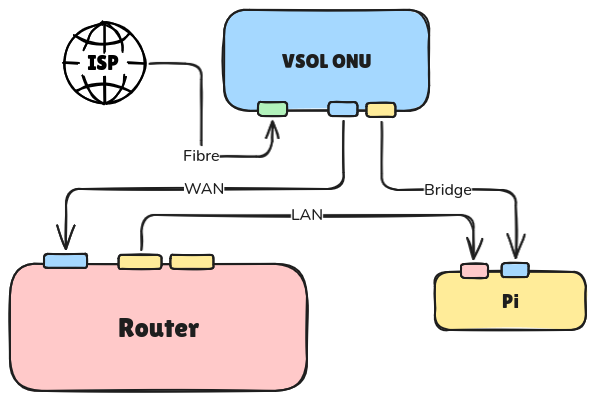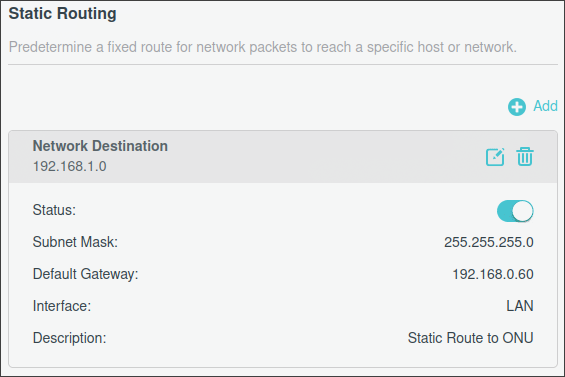If you’ve ever wanted to access your VSOL ONU’s web interface (usually at 192.168.1.1) from
your LAN (say 192.168.0.0/24), you might have hit a wall—especially if your router doesn’t
allow assigning multiple WAN IPs. In this guide, I’ll walk you through how to bridge that
gap using a Raspberry Pi or any other device with at least two network interfaces.
We’ll use the following setup

Prepare the Raspberry Pi
- Connect the Pi’s
eth0to your Router’s LAN port. - Connect
eth1(USB-to-Ethernet adapter or secondary port) to ONU’s bridge port.
Your Pi now has two interfaces: one in your LAN and one going to the ONU.
Assign IP to Pi’s ONU-facing interface
The ONU doesn’t provide DHCP on its bridge port, so assign a static IP manually say 192.168.1.5/24 by running
sudo ip addr add 192.168.1.5/24 dev eth1
You can make this persistent using netplan or your preferred tool such that it doesn’t get lost after a reboot. Your Pi should be able to ping the ONU:
ping 192.168.1.1
Add a static route on your router
In your router’s web interface, go to Static Routing and add this route:
| Destination | 192.168.1.0 |
|---|---|
| Subnet Mask | 255.255.255.0 |
| Gateway IP | Pi’s IP on the LAN (e.g., 192.168.0.60) |
| Interface | LAN |
Now your router knows how to forward traffic for 192.168.1.0/24 through the Pi.
You will have to statically bind this address to your Pi so that it doesn’t change

Enable IP forwarding on the Pi
We need to allow Pi to forward IPv4 packets
sudo sysctl -w net.ipv4.ip_forward=1
For this to persist across reboot, edit /etc/sysctl.conf and add (or uncomment)
net.ipv4.ip_forward=1
Now, we need to setup IP forwarding rules using iptables command to allow forwarding across eth0 and eth1
# LAN to ONU
sudo iptables -A FORWARD -i eth0 -o eth1 -j ACCEPT
# ONU to LAN
sudo iptables -A FORWARD -i eth1 -o eth0 -j ACCEPT
Since ONU doesn’t know how to return packets to your LAN, we will enable NAT
sudo iptables -t nat -A POSTROUTING -o eth1 -s 192.168.0.0/24 -d 192.168.1.0/24 -j MASQUERADE
iptables changes are lost after reboot. To persist them
sudo apt install iptables-persistent
sudo netfilter-persistent save
✅ All Done!
Now from any device in your LAN (192.168.0.x), just open a browser and head to http://192.168.1.1 to access the ONU’s management network.